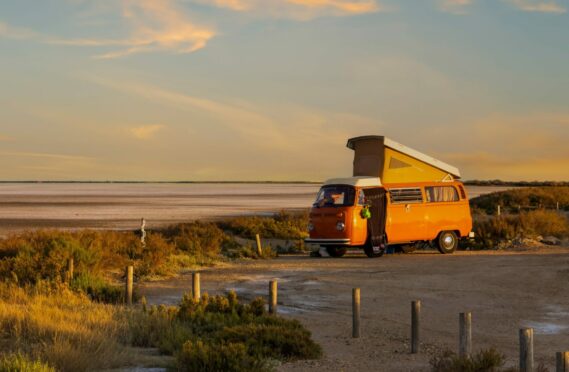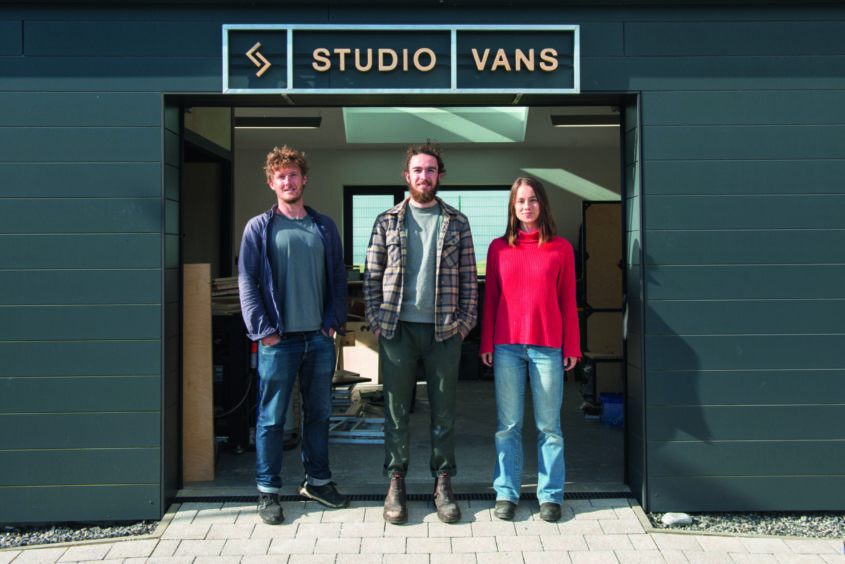
As more and more people are discovering the joy of campervanning, the range of vans is growing to meet the varied needs of this diverse community.
There are the classic VWs, coveted for their iconic look and quality build, the Japan-imported Mazda Bongo, now gaining a cult following, and a host of vans and people carriers kitted out with basic interior designs.
Then there are those brave folk who set about building their own dream campervan. Social media is packed with inspiring DIY conversions, motivated not solely by budget but the chance to create their own personalised space.
Despite the plethora of finished campers available, there is a strong desire for options that suit individual needs. And this is where a van conversion company on the Outer Hebrides found its niche.
Rob Hall, Tara Drummie and Calum Ferguson of Studio Vans have created a system of modular fit-outs that allows customers to design their own interior unique to their needs, which can then be easily moved around like puzzle pieces for different adventures or transferred entirely to a new vehicle.
“We aren’t trying to make your belongings small enough to fit in a van but, instead, work back from the experience you seek as the starting point. And build the custom interior around that idea,” says Rob.
With the motto “It doesn’t matter where you go, just as long as you do”, the team’s enthusiasm for touring is captivating. As any van-fanatic knows, a trip is more than sightseeing, it can be transformative. And Studio Vans aims to make each journey special.
Based on the Hebridean island of Benbecula, the three came together to create a brand-new “ecosystem” to connect tourers and their vans with top makers and creators to forge the best experience possible.
Recognising electric campers as the future, Studio Vans’ removable conversions mean the interior can be transferred when the customer buys an electric model, significantly reducing waste and cost.
“Island crofters may remove the whole interior temporarily to transport sheep, for example,” says Rob.
Another key challenge for the campervan community and industry is how to tour in an environmentally conscious way. And the build is part of that. “Challenging customers to do things more sustainably is a key motivation for us at Studio Vans,” says Rob.
“Materials are sought based on both their aesthetic and environmental impact, plywood releases minimal harmful gas, aluminium is robust and recyclable and the campervan kit itself is a for-life product, designed to outlive the customer’s van, allowing them to take it with them and into their next vehicle, if they so choose,” says Rob.
Where possible, the team use recycled sea plastic, which, unfortunately, there’s a lot of on the island shores.
Rob, a keen surfer, says: “Everywhere in the world that I’ve surfed, there are bits of plastic washing up. More action needs to be taken to do something with that plastic.”
Studio Vans have taken on that challenge and bought the machinery to recycle ocean plastic into components for their vans. They also collaborate with other makers – such as Glasgow’s Still Life – to use this debris for permanent products, such as stools, vases and surfing fins.
“By creating enduring, useful items we can prevent the plastic ending up back in the sea,” says communications co-ordinator and designer Tara.
Focusing on the important small details and making every item work for its place in their vans, the team strives to create the best touring experience possible.
“We also use beautifully designed ceramics for kitchen utensils rather than plastic, which gives a much more pleasant experience as well as being more sustainable,” she says. “Why do we have to eat and drink from unpleasant plastic items just because we are on the road?”
The eco-conscious trio also found a use for waste wool, often left lying around on island crofts, as an insulator instead of plastics and chemicals. This offers a revenue stream for crofters as well as reducing waste.
“We are currently working with a Syrian upholsterer in Stornoway to spin this wool into a durable material for all sorts of uses in our vans,” says Tara.
Tara, originally from England, and Callum who grew up in North Uist, attended Glasgow School of Art and sustainability drives their designs.
“A lot of my work is based around sustainability and circular economies,” Callum says. “I think it’s also important that we bring people into that too.”
“The Hebrides are full of multidisciplinary skillsets”, he says. “Take fishermen and crofters – even the simplest things like making nets is a craft, and many crofters are skilled at engineering and construction.”
“Often there are no mechanics to come and fix machinery or a joiner to build sheds or fences. A crofter is doing five or six jobs that a professional person would do.
“The islands are full of really skilled and capable people with interesting abilities.”
Rob, a chartered mechanical and environmental engineer who grew up on the shores of Loch Lomond, lived for a long time in Sydney and chose to relocate to Benbecula in 2019.
“The innovative culture and history of the islands is so beneficial for this type of business which is constantly evolving,” says Rob.
“And, with advances in broadband, I could work anywhere, so why not be in this beautiful place with fantastic surfing!”
The Studio Vans team has really connected with the local community on Benbecula with events such as Van Chat, where folk pop by for coffee and a blether.
“I’ll often get locals popping in with ideas for things we can make with recycled plastic. The schools and local groups do regular beach cleans and we gather the plastics from there,” says Tara.
Studio Vans employees are also encouraged to learn Gaelic and the team are 50% there. “If we’re going to be an authentic design identity, we can’t ignore Gaelic,” says Tara.
Studio Vans focus on the quality of even the smallest experiences, and they transfer this ethos to their own life. On the islands the team take time to surf, enjoy their surroundings and be creative.
“I value moments of time out,” Rob says. “I like a good, contemplative coffee. Sometimes I prep one at the beach before a surf,” he says.
That’s van life.

Enjoy the convenience of having The Sunday Post delivered as a digital ePaper straight to your smartphone, tablet or computer.
Subscribe for only £5.49 a month and enjoy all the benefits of the printed paper as a digital replica.
Subscribe
